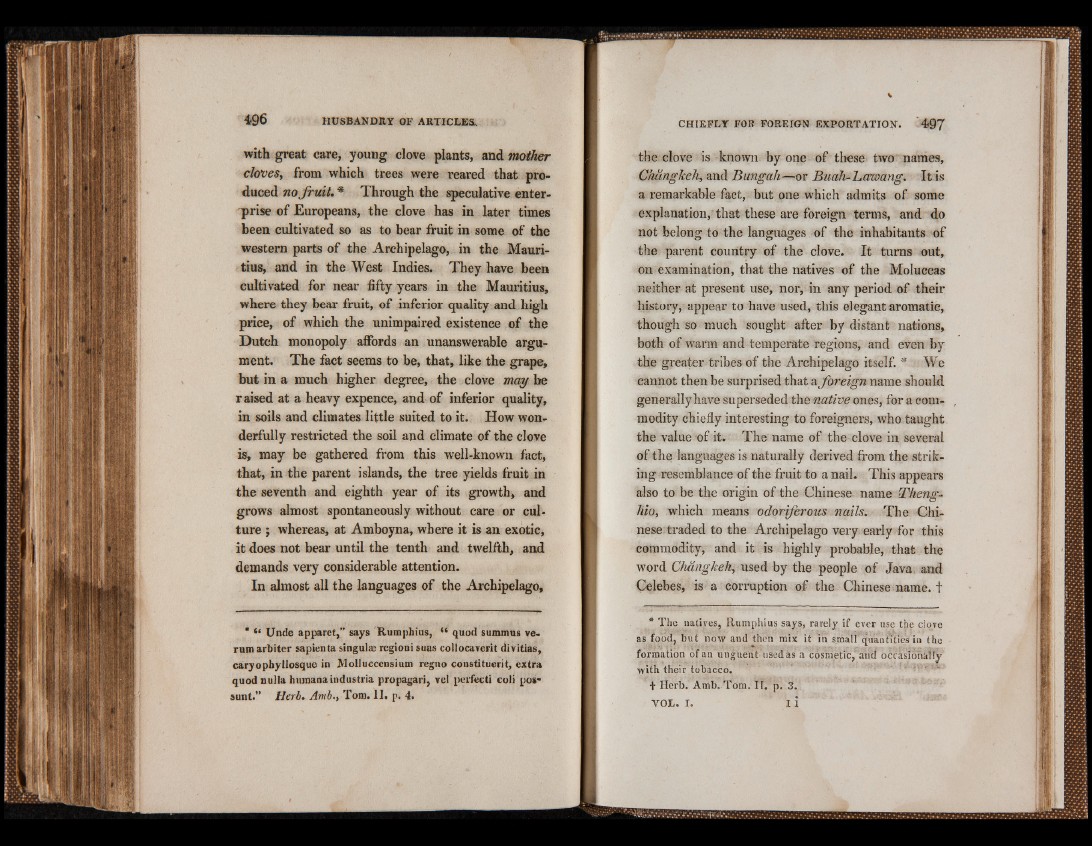
with great care, young clove plants, and mother
cloves, from which trees were reared that produced
no fruit. * Through the speculative enter-
'prise of Europeans, the clove has in later times
been cultivated so as to bear fruit in some of the
western parts of the Archipelago, in the Mauritius,
and in the West Indies. They have been
cultivated for near fifty years in the Mauritius,
where they bear fruit, of inferior quality and high
price, of which the unimpaired existence of the
Dutch monopoly affords an unanswerable argument.
The fact seems to be, that, like the grape,
but in a much higher degree, the clove may be
raised at a heavy expence, and of inferior quality,
in soils and climates little suited to it. How wonderfully
restricted the soil and climate of the clove
is, may be gathered from this well-known fact,
that, in the parent islands, the tree yields fruit in
the seventh and eighth year of its growth, and
grows almost spontaneously without care or culture
; whereas, at Amboyna, where it is an exotic,
it does not bear until the tenth and twelfth, and
demands very considerable attention.
In almost all the languages of the Archipelago,
* ** Unde apparet,” says Rumphius, ** quod summus ve-
rum arbiter sapienta singular regionisuas coliocaverit divitias,
caryopbyflosquc in Molluccensium regno constituent, extra
quod nulla hnmanaindustria propagari, vel perfect! coli pos-
sunt.” Herb. Amb., Tom. I I. p. 4.
the clove is known by one of these two names,
Changkeh, and Bungah—or Buak-Lawang. It is
a remarkable fact, but one which admits of some
explanation,'that these are foreign terms, and do
not belong to the languages of the inhabitants of
the parent country of the clove. It turns out,
on examination, that the natives of the Moluccas
neither at present use, nor, in any period of their
history, appear to have used, this elegant aromatic,
though so much sought after by distant nations,
both of warm and temperate regions, and even by
the greater tribes of the Archipelago itself. * We
cannot then be surprised that a foreign name should
generally have superseded the native ones, for a com- ,
modity chiefly interesting to foreigners, who taught
the value of it. The name of the clove in several
of the languages is naturally derived from the striking
resemblance of the fruit to a nail. This appears
also to be the origin of the Chinese name Thene O o
hio, which means odoriferous nails. The Chinese
traded to the Archipelago very early for this
commodity, and it is highly probable, that the
word Changkeh, used by the people of Java and
Celebes, is a corruption of the Chinese name, t
* The natives, Rumphius says, rarely if ever use the clove
as food, but now and then mix it in small quantities in the
formation ¿fan unguent used as a cosmetic,1 aiid occasionally
with their tobacco.
+ Herb. Amb. Tom. If. p. 3.
VOL. I . l i